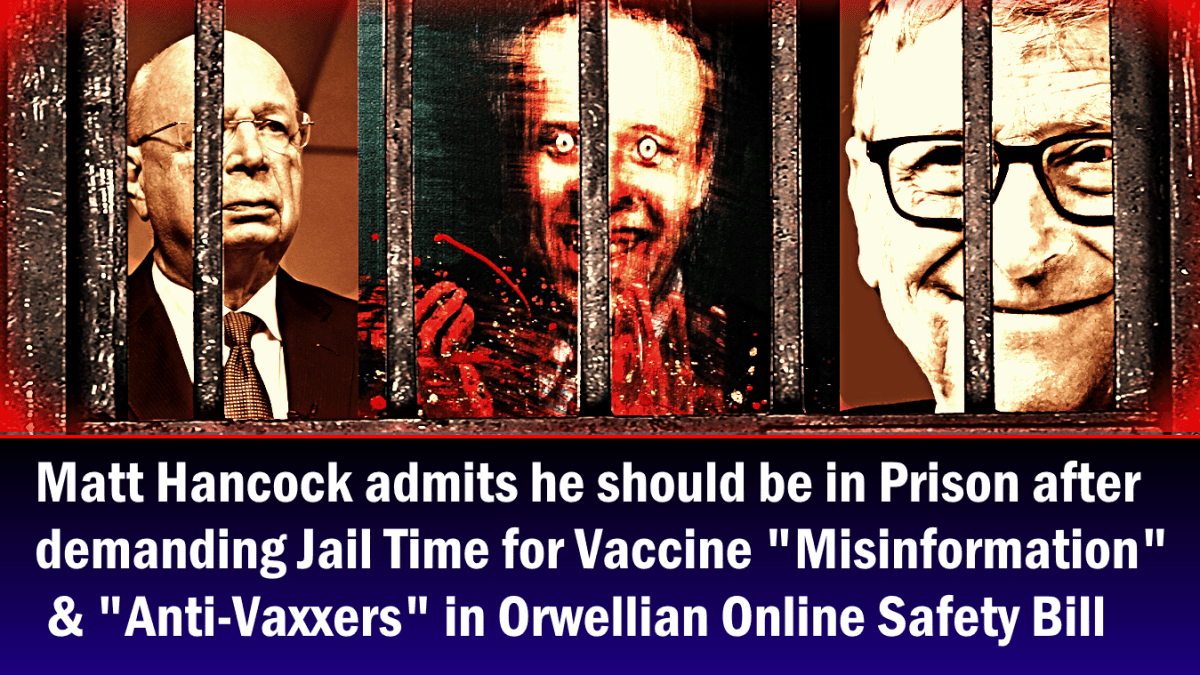
Matt Hancock admits he should be in Prison after demanding Jail Time for Vaccine Misinfo & “Anti-Vaxxers” in Orwellian Online Safety Bill
In a world where power is increasingly consolidated among a select few individuals and colossal corporations, critical thinkers who question the establishment face growing threats.
With one of those threats being the proposed Online Safety Bill, that has generated significant controversy, with critics arguing that it represents a dangerous infringement on freedom of speech and will have dystopian consequences.
But now, Matt Hancock, the former Health Secretary of the UK, who has a contentious record and had a notorious affair during lock down, has expressed his support for an outrageous amendment to the already controversial Bill.
Hancock has demanded that prison sentences be imposed on “anti-vaxxers” and anyone who vocalises, writes or shares what the Government of the day deems to be “misinformation” surrounding vaccines.
The bill is reminiscent of George Orwell’s dystopian vision in “1984,” where free thought is stifled, and conformity is enforced. The importance of hearing all sides of a story and questioning everything to make informed decisions cannot be overstated.
And while the Online Safety Bill and the consequences of it will mark a concerning shift toward criminalising dissent and eroding our fundamental right to freedom of speech, it will also allow the courts to do something many people in this country have been demanding for the past few years.
Because what Matt Hancock, who orchestrated the cruel and criminal premature deaths of the elderly and vulnerable during the alleged pandemic, doesn’t realise, is that if his demand is made law, he himself could face prison time because he has been spreading propaganda, lies, misinformation and disinformation about the Covid-19 vaccines since December 2020.
Let’s not lose touch…Your Government and Big Tech are actively trying to censor the information reported by The Exposé to serve their own needs. Subscribe now to make sure you receive the latest uncensored news in your inbox…
The Dangers of Censorship and the Online Harms Bill
The Online Harms Bill, if passed, will lead to widespread censorship and the suppression of dissenting voices, particularly in areas like vaccine safety.
By limiting access to alternative perspectives, the Bill will undermine an individual’s right to freedom of speech, a cornerstone of democratic societies.
Matt Hancock’s Record and the Importance of Open Dialogue
Matt Hancock is a British politician who served as the Secretary of State for Health and Social Care from 2018 to 2021. He was involved in several controversies during his tenure, most notably his handling of the COVID-19 pandemic and his resignation following an extramarital affair.
Hancock was criticized by those who fell hook, line and sinker for the overstated dangers of the alleged Covid-19 disease, for the lack of personal protective equipment (PPE) for healthcare workers and the decision to discharge hospital patients into care homes without adequate testing .
He has also faced criticism for his overall handling of the COVID-19 pandemic and his personal conduct, including an extramarital affair. But his most controversial and criminal actions surround what he allowed to happen to the elderly and vulnerable behind the closed doors of care homes.
During April and May 2020, care homes in England and Wales experienced a significant increase in the number of deaths compared to the five-year average.
According to the Office for National Statistics (ONS), there were 34,440 deaths in care homes in England and Wales during these two months, which is approximately 20,000 more than the five-year average for the same period.
This sharp rise in care home deaths raises serious concerns about the quality of care and the potential impact of policies and practices during the COVID-19 pandemic. But it has been proven that the main reason for the increase in deaths was the increased use of midazolam and the implementation of DNR orders without gaining consent from the resident/patient or their family.
Under the direction of then-Health Secretary Matt Hancock, the UK saw a sharp increase in midazolam use in care homes during 2020. Reports confirm that the amount of midazolam ordered was significantly higher than in previous years, raising concerns about the safety and appropriateness of its widespread use, particularly in the context of the alleged COVID-19 pandemic.
This is because Midazolam, a sedative-hypnotic medication, is primarily used for managing anxiety, seizures, and as a pre-anesthetic agent. It causes depressed respiratory function, especially in elderly patients or those with pre-existing respiratory issues.
Therefore, its use in treating respiratory diseases in care homes instead of under the supervision of doctors in what were empty hospitals at the time is not just extremely controversial, it’s criminal.
These controversies and criminal actions underscore the importance of scrutinizing public officials and questioning their decisions. By silencing alternative viewpoints, the Online Safety Bill will make it more difficult to hold politicians accountable.
Examples of Vaccine-Related Issues and the Right to Question:
Past instances of harmful vaccines underscore the necessity of questioning the safety and efficacy of any vaccine or pharmaceutical.
Here are just a few examples –
- The Cutter Incident (1955): Cutter Laboratories produced a polio vaccine that caused 40,000 cases of polio, leaving 200 children paralyzed and causing 10 deaths. The incident led to increased regulations and oversight in the vaccine production process.
- The 1976 swine flu vaccine program: The United States government’s mass vaccination campaign against swine flu led to 500 cases of Guillain-Barré Syndrome and 25 deaths. The program was halted due to safety concerns and public backlash.
- RotaShield (1990s): Wyeth (now Pfizer) produced a rotavirus vaccine linked to an increased risk of intussusception, a life-threatening bowel obstruction. The vaccine was withdrawn from the market after causing several infant deaths .
- Pandemrix (2009): A swine flu vaccine manufactured by GlaxoSmithKline was linked to a significant increase in narcolepsy cases, particularly among children and adolescents. It was eventually withdrawn from use in Europe.
These examples highlight the importance of questioning the safety and efficacy of vaccines and other pharmaceutical products without fear of legal repercussions. It is crucial for individuals to have access to diverse perspectives to make informed decisions about their health.
The Orwellian Nature of the Online Safety Bill
The potential implications of the Online Harms Bill are reminiscent of George Orwell’s vision of a totalitarian future in his novel, “1984.”
In the book, the state exercises strict control over information, suppressing dissent and shaping public opinion through censorship.
The Online Safety Bill will pave the way for a similar reality, where dissenting voices are silenced, and public discourse is tightly controlled.
The dystopian consequences of the Online Harms Bill are extensive, including the possibility of imprisonment for those who merely question the safety of a vaccine or drug. This Orwellian outcome would further erode our fundamental rights and set a dangerous precedent for future free speech restrictions.
Other Dystopian Consequences:
Beyond the erosion of free speech, the Online Safety Bill will lead to other dystopian outcomes, such as increased surveillance, self-censorship, and the marginalization of minority viewpoints.
These consequences could have a chilling effect on public discourse and ultimately undermine the democratic principles on which modern societies are built.
The chilling effect of the Online Harms Bill will also extend beyond the silencing of dissenting voices to the suppression of scientific debate and innovation.
By criminalizing the expression of alternative viewpoints, the bill will discourage researchers from exploring novel ideas or questioning established paradigms, ultimately hindering scientific progress and potentially stifling life-saving discoveries.
The Bill will also exacerbate social divisions and polarization by limiting exposure to diverse perspectives.
When individuals are only exposed to information that aligns with their preexisting beliefs, they are less likely to engage in constructive dialogue and more likely to become entrenched in their views.
This will contribute to a more fragmented and polarized society, where understanding and cooperation are increasingly difficult to achieve.
Potential consequences for questioning vaccine safety
Under the Online Safety Bill, individuals who question the safety of vaccines or drugs could potentially face legal repercussions, including fines or imprisonment.
This would be a deeply concerning development, as it would effectively criminalize the act of seeking information and asking legitimate questions about the safety and efficacy of medical interventions.
It is outrageous to consider punishing individuals for exercising their right to freedom of speech and their responsibility to make informed decisions about their health.
Such punitive measures would only serve to undermine public trust in the regulatory and medical establishment, making it even more challenging to address genuine concerns and promote public health.
The Covid-19 Vaccine Contradiction
The history of vaccine development and administration has shown that vaccines can occasionally be withdrawn from the market due to safety concerns.
It is therefore troubling to consider the difference in approach between previous cases, where vaccines were withdrawn after a few reported adverse events, and the current situation with Covid-19 vaccines, which have been linked to severe injuries and even fatalities but are still being administered.
The Covid-19 vaccines have not been withdrawn, despite officially causing numerous severe injuries such as thrombosis and myocarditis, and hundreds to thousands of confirmed deaths worldwide [6].
Furthermore, tens to hundreds of thousands of deaths have been reported as possibly linked to the vaccines [7].
Comparing this to previous vaccines that were withdrawn due to a few injuries or deaths raises very serious questions about the decision-making processes and potential external influences, such as political pressure or financial interests.
The Covid vaccines’ emergency use authorization for children as young as six months old is another contentious issue.
Since the pandemic’s inception, it has been known that children are not at high risk of severe disease, and the Covid-19 vaccines do not prevent infection or transmission [8].
The decision to extend emergency use authorization to such a young population defies logic and warrants extreme scrutiny. Especially when we consider the concerning increase in child deaths across Europe that started to occur the week following the European Medicine Agency’s decision to extend the Emergency Use Authorization of the Pfizer vaccine to 12 to 15-year-olds.
It was the summer of 2021 when the European Medicines Agency (EMA) approved the use of the Pfizer COVID-19 vaccine for children aged 12 to 15. The decision was met with unjustified excitement and relief by many parents who had been eagerly waiting for a vaccine for their children.
However, soon after the vaccine rollout for children began, a shocking rise in excess deaths among children was reported across Europe.
And sadly, as of week 12, 2023, there has been a 760% increase in excess deaths among children aged 0 to 14.
This shocking increase in deaths and the decision to vaccinate children as young as 6 months old with Covid-19 vaccines highlights the importance of maintaining open and transparent dialogue about pharmaceutical interventions.
Given the complexities and uncertainties surrounding vaccine development and administration, it is crucial that individuals have the right to question and discuss the safety and efficacy of these medical interventions without fear of legal repercussions.
It is essential to recognize that questioning pharmaceuticals is not inherently anti-science or anti-vaccine. In many cases, it reflects a commitment to evidence-based medicine and the pursuit of the highest possible standards of safety and efficacy.
Therefore, it is crucial that the Online Harms Bill does not stifle these important discussions or infringe upon individuals’ rights to question and evaluate medical interventions, including vaccines for children as young as 6 months old.
It’s not about Health, It’s about Wealth
Bill Gates, the co-founder of Microsoft, is also the co-chair of the Bill & Melinda Gates Foundation, which has been actively involved in global health initiatives, including vaccination programs. Gates’ father, William H. Gates Sr., was a lawyer and philanthropist who served as co-chair of the foundation until his death in 2020 [1].
The Bill & Melinda Gates Foundation has sponsored, promoted, and invested in various vaccine initiatives, including some related to COVID-19.
One of the controversies surrounding the foundation’s involvement in vaccines is the funding of regulatory bodies that approve these vaccines. For example, the Gates Foundation has donated to the European Medicines Agency (EMA) [2] and the US Food and Drug Administration (FDA) [3].
Critics argue that this may create a conflict of interest, as the same regulators are responsible for approving vaccines in which the foundation has invested.
Bill Gates is not a medical doctor or scientist, but he has become a prominent voice in promoting vaccination.
It is clear that Gates uses his influence to promote vaccines for financial gain, as his foundation holds investments in several pharmaceutical companies that develop and produce vaccines [4].
There have been instances where vaccines sponsored or promoted by the Gates Foundation have been associated with adverse effects.
For example, in 2009, a vaccine against the Human Papillomavirus (HPV) funded by the foundation in India was linked to adverse events and deaths, leading to the suspension of the program [6].
In the case of COVID-19 vaccines, the Gates Foundation has supported the development of several vaccine candidates, including those produced by AstraZeneca, Pfizer, and Moderna, which have been associated with severe side effects such as blood clotting and myocarditis and death. [7].
In conclusion, while Bill Gates and the Gates Foundation have been involved in promoting and investing in vaccine development, there are concerns about potential conflicts of interest and the influence of non-medical professionals in shaping public health policy.
It is crucial to maintain transparency and open dialogue in these matters to ensure public trust and the safety and efficacy of vaccines. The Online Safety Bill will no longer allow this to happen and punish those who dare to think for themselves.
Sources:
[1] https://www.gatesfoundation.org/who-we-are/general-information/leadership/bill-gates [2] https://www.ema.europa.eu/en/partners-networks/academia/funded-projects [3] https://www.fda.gov/patients/learn-about-drug-and-device-approvals/foundation-fda-history [4] https://www.forbes.com/sites/matthewherper/2020/05/18/the-bill-and-melinda-gates-foundations-investments-in-coronavirus-vaccines/ [5] https://www.gatesfoundation.org/Who-We-Are/General-Information/Foundation-FAQ [6] https://www.ncbi.nlm.nih.gov/pmc/articles/PMC3484745/ [7] https://www.cdc.gov/coronavirus/2019-ncov/vaccines/safety/adverse-events.html
Matt Hancock should already be in Prison
The decision by then-Health Secretary Matt Hancock to discharge hospital patients into care homes during the early stages of the COVID-19 pandemic had far-reaching consequences. Thousands of vulnerable care home residents were isolated in a single room for months one end and denied proper medical treatment despite hospitals being the emptiest they had ever been.
This led to a significant number of premature deaths among this population after they were unnecessarily placed on end of life care, administered extremely high doses of midazolam and morphine, and deprived of food and water. [1].
This allowed the Government to claim care home residents had died of Covid-19 instead of what was effectively democide, so that they could justify locking down the entire country.
Isolating care home residents, in combination with the refusal of some GPs to visit ill residents in care homes, further exacerbated the situation. The isolation of residents took a heavy toll on their mental health, as they were separated from their families and loved ones for extended periods [2].
Another scandal that emerged during this time was the pressure placed on social care staff to implement Do Not Resuscitate (DNR) orders on care home residents without informing the patients or their families.
This was revealed in reports from the Care Quality Commission (CQC) and Amnesty International, which found that many care home staff felt coerced into placing DNR orders on residents, potentially leading to unnecessary deaths and violating the residents’ rights to make informed decisions about their own care [3].
It is arguable that the combined impact of these decisions, along with the suffering and loss of life they caused, should be considered when discussing the potential consequences of Matt Hancock’s support for the Online Harms Bill. If the right to freedom of speech is to be curtailed for those who question vaccine safety, it is worth considering whether the same consequences should apply to those who made decisions that led to the unnecessary suffering and death of thousands of vulnerable individuals.
Sources:
[1] https://www.bmj.com/content/369/bmj.m1932 [2] https://www.mentalhealth.org.uk/coronavirus/coping-with-loneliness [3] https://www.amnesty.org.uk/press-releases/uk-discrimination-against-older-people-amid-pandemic-must-be-investigatedThe Online Safety Bill could put Matt Hancock in Prison
Throughout the COVID-19 pandemic, Matt Hancock, the former UK Health Secretary, has made several statements regarding the effectiveness and safety of COVID-19 vaccines. Some of these statements have been called into question by critics and experts.

Below are just a few examples:
- In a BBC interview in January 2021, Hancock claimed that the vaccines would provide protection against COVID-19 after a single dose [1]. However, later studies showed that a single dose offered no protection and that two doses offered little protection at all [2].
- In February 2021, Hancock stated that the AstraZeneca vaccine was effective against the alleged South African variant of the virus [3].
However, a study from South Africa proved that the vaccine offered minimal protection against mild and moderate cases caused by this variant [4].
The UK government later updated its guidance on the use of the AstraZeneca vaccine, stating that its effectiveness against the South African variant was uncertain [5].
- Hancock also consistently assured the public that COVID-19 vaccines were safe and that side effects were rare.
However, reports of severe side effects, such as blood clots following the AstraZeneca vaccine, prompted several countries to limit its use or suspend it altogether [6]. These events demonstrated that there were serious safety concerns that needed to be addressed.
These few examples illustrate that some of the information provided by Matt Hancock about the COVID-19 vaccines’ effectiveness and safety was not accurate or consistent with emerging evidence. Therefore, he was spreading propaganda, lies, misinformation and disinformation.
But we already knew this thanks to the official data. The UK government recently released official figures that show a shocking truth: the fully vaccinated population accounted for 92% of Covid-19 deaths throughout the entirety of 2022, and 9 in every 10 Covid-19 deaths in England over the past two years.
This highlights the importance of questioning and verifying information provided by public officials, especially when it comes to public health decisions. But it will also serve as evidence to put Hancock behind bars if the Online Safety Bill is passed and criminalises “anti-vaxxers” and vaccine “misinformation”.
Sources:
[1] https://www.bbc.com/news/av/uk-55566467 [2] https://www.thelancet.com/journals/lancet/article/PIIS0140-6736(21)00432-3/fulltext [3] https://www.reuters.com/article/uk-health-coronavirus-britain-vaccine-idUSKBN2A70T6 [4] https://www.nejm.org/doi/full/10.1056/NEJMoa2102214 [5] https://www.gov.uk/government/publications/covid-19-vaccination-blood-clotting-information-for-healthcare-professionals/information-for-healthcare-professionals-on-blood-clotting-following-covid-19-vaccination [6] https://www.bbc.com/news/world-europe-56498205
Conclusion
The Online Safety Bill will have dystopian consequences, and will help to lead to the introduction of a Social Credit Score System, Digital ID, and a Cashless Society, which the World Economic Forum (WEF) and its founder, Klaus Schwab, are already lobbying to put in place as part of the plan for The Great Reset.
These initiatives will lead to increased surveillance, loss of privacy, and restricted individual freedoms. By stifling debate and dissent on vaccines and other critical topics, the Online Safety Bill will contribute to the creation of a dystopian society.
The questionable decisions highlighted in this article exemplify why the criminalization of questioning pharmaceuticals through the Online Harms Bill should be resisted. We must preserve the right to voice our concerns and engage in open dialogue to foster transparency, scientific progress, and better decision-making.
For our critical-thinking audience who seeks the truth, it is vital to recognize the potential dangers of the Online Safety Bill and advocate for a world where dissenting voices are not silenced, and freedom of speech is protected.
In order to preserve the democratic values of open dialogue and freedom of expression, it is essential to oppose the Online Safety Bill and its implications and ensure that alternative viewpoints are not silenced in the name of public safety.
Sources:
- [1] https://twitter.com/MattHancock/status/1496481276596076546
- [2] Offit, P. A. (2005). The Cutter incident, 50 years later. The New England Journal of Medicine, 352(14), 1411-1412.
- [3] Schonberger, L. B., Bregman, D. J., Sullivan-Bolyai, J. Z., Keenlyside, R. A., Ziegler, D. W., Retailliau, H. F., … & Hattwick, M. A. (1979). Guillain-Barré syndrome following vaccination in the National Influenza Immunization Program, United States, 1976–1977. American Journal of Epidemiology, 110(2), 105-123.
- [4] Murphy, T. V., Gargiullo, P. M., Massoudi, M. S., Nelson, D. B., Jumaan, A. O., Okoro, C. A., … & Schonberger, L. B. (2001). Intussusception among infants given an oral rotavirus vaccine. New England Journal of Medicine, 344(8), 564-572.
- [5] Dauvilliers, Y., Arnulf, I., & Lecendreux, M. (2013). Increased risk of narcolepsy in children and adults after pandemic H1N1 vaccination in France. Brain, 136(8), 2486-2496.
- [6] https://www.ema.europa.eu/en/human-regulatory/overview/public-health-threats/coronavirus-disease-covid-19/treatments-vaccines/vaccines-covid-19/covid-19-vaccines-key-facts
- [7] https://www.cdc.gov/coronavirus/2019-ncov/vaccines/safety/adverse-events.html
- [8] https://www.cdc.gov/coronavirus/2019-ncov/science/science-briefs/fully-vaccinated-people.html









